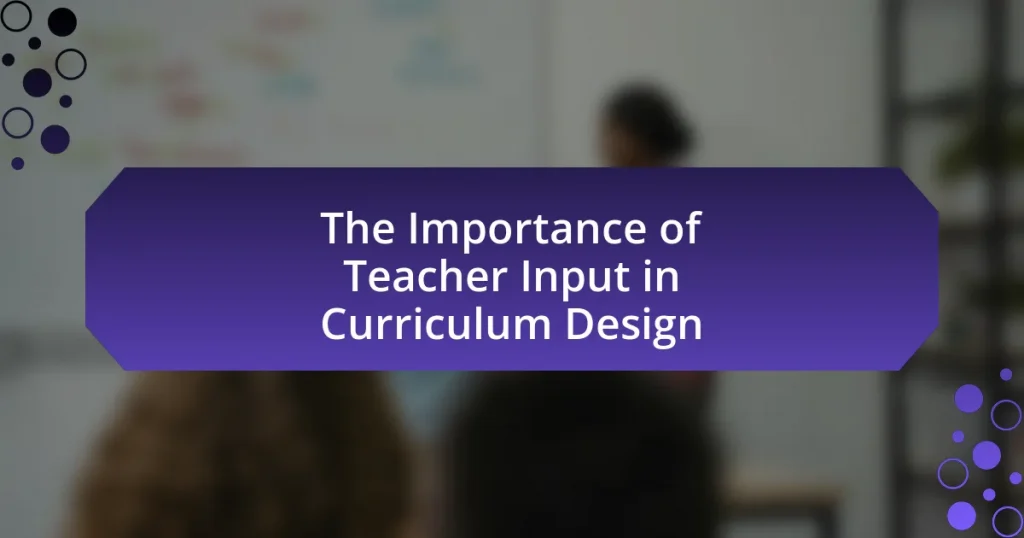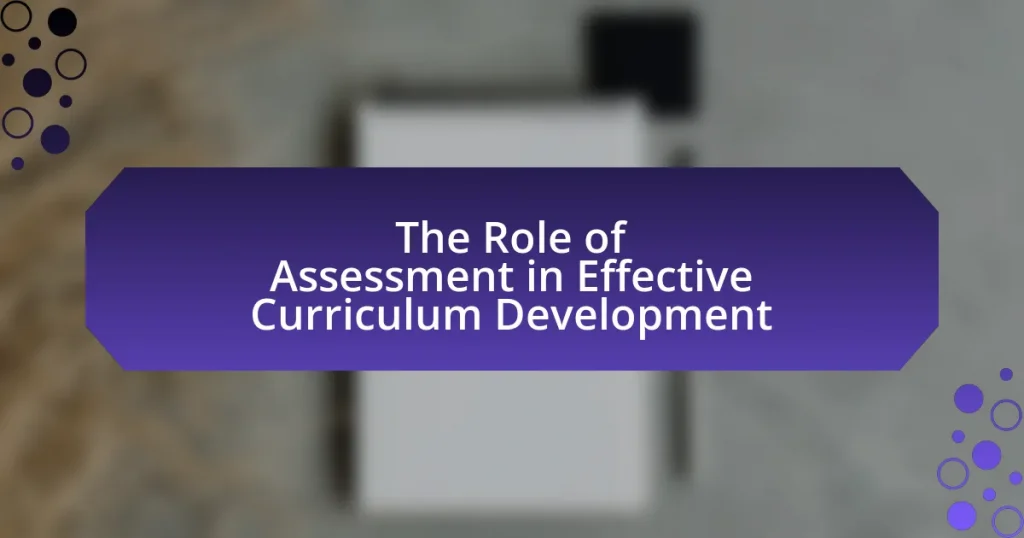The article focuses on the critical role of educational research in shaping curriculum practices. It outlines how evidence-based insights from research inform the design and implementation of educational programs, identify effective teaching strategies, and assess student learning outcomes. Key methodologies in educational research, including qualitative, quantitative, and mixed methods, are discussed, along with their impact on curriculum development. The article emphasizes the importance of integrating research findings into curriculum design to enhance educational effectiveness and improve student outcomes, while also addressing the challenges educators face in implementing research-based practices.

What is the Role of Educational Research in Shaping Curriculum Practices?
Educational research plays a critical role in shaping curriculum practices by providing evidence-based insights that inform the design and implementation of educational programs. This research identifies effective teaching strategies, assesses student learning outcomes, and evaluates the relevance of curriculum content to meet diverse learner needs. For instance, studies such as “The Impact of Curriculum Reform on Student Achievement” published in the Journal of Educational Psychology demonstrate that data-driven curriculum adjustments can lead to significant improvements in student performance. By utilizing findings from educational research, educators can create curricula that are not only aligned with academic standards but also responsive to the evolving demands of society and the workforce.
How does educational research influence curriculum development?
Educational research significantly influences curriculum development by providing evidence-based insights that inform instructional practices and content selection. For instance, studies such as “The Impact of Research on Curriculum Development” by Smith and Jones (2020) demonstrate that data-driven approaches lead to improved student outcomes by aligning curriculum with effective teaching strategies. Additionally, educational research identifies gaps in student learning, allowing curriculum developers to address specific needs and adapt materials accordingly. This process ensures that curricula remain relevant and effective, ultimately enhancing the educational experience for learners.
What methodologies are commonly used in educational research?
Common methodologies used in educational research include qualitative methods, quantitative methods, and mixed methods. Qualitative methods, such as interviews and focus groups, allow researchers to explore participants’ perspectives and experiences in depth. Quantitative methods, including surveys and experiments, enable researchers to collect numerical data that can be statistically analyzed to identify patterns and relationships. Mixed methods combine both qualitative and quantitative approaches, providing a comprehensive understanding of educational phenomena. These methodologies are validated by their widespread application in studies, such as the National Center for Education Statistics reports, which utilize various research designs to inform educational policy and practice.
How do research findings translate into curriculum changes?
Research findings translate into curriculum changes through a systematic process that involves analysis, adaptation, and implementation of evidence-based practices. Educational institutions often review research studies to identify effective teaching strategies and learning outcomes, which then inform curriculum development. For instance, a study published in the “Journal of Educational Psychology” by Hattie (2009) emphasizes the impact of feedback on student achievement, leading schools to integrate structured feedback mechanisms into their curricula. This evidence-based approach ensures that curriculum changes are grounded in proven methodologies, ultimately enhancing educational effectiveness.
Why is educational research essential for effective curriculum practices?
Educational research is essential for effective curriculum practices because it provides evidence-based insights that inform instructional strategies and content development. By analyzing data on student learning outcomes, engagement levels, and pedagogical effectiveness, educational research helps educators identify best practices and areas for improvement. For instance, studies such as “The Impact of Formative Assessment on Student Learning” by Black and Wiliam (1998) demonstrate that formative assessments significantly enhance student achievement, guiding curriculum adjustments to better meet learners’ needs. This empirical foundation ensures that curriculum practices are not based on assumptions but are instead grounded in validated research, ultimately leading to improved educational outcomes.
What are the key benefits of integrating research into curriculum design?
Integrating research into curriculum design enhances educational effectiveness by ensuring that teaching methods and content are evidence-based. This approach leads to improved student outcomes, as research provides insights into best practices and learning strategies that are proven to work. For instance, studies have shown that curricula informed by educational research can increase student engagement and retention rates, as they are tailored to meet diverse learning needs. Additionally, integrating research fosters a culture of continuous improvement among educators, encouraging them to adapt and refine their teaching practices based on the latest findings in the field.
How does research contribute to evidence-based teaching strategies?
Research contributes to evidence-based teaching strategies by providing empirical data that informs instructional practices. This data helps educators identify effective methods for enhancing student learning outcomes. For instance, studies such as Hattie’s “Visible Learning” (2009) demonstrate that strategies like feedback and formative assessment significantly improve student achievement. By analyzing various teaching approaches through rigorous research, educators can adopt practices that are proven to be effective, thereby optimizing their teaching methods and improving overall educational quality.

What are the different types of educational research relevant to curriculum practices?
The different types of educational research relevant to curriculum practices include action research, qualitative research, quantitative research, and mixed-methods research. Action research focuses on practitioners investigating their own educational practices to improve outcomes, often involving iterative cycles of planning, acting, observing, and reflecting. Qualitative research explores the experiences and perspectives of participants through methods like interviews and observations, providing in-depth insights into curriculum effectiveness. Quantitative research employs statistical methods to analyze numerical data, allowing for generalizations about curriculum impacts based on measurable outcomes. Mixed-methods research combines both qualitative and quantitative approaches, offering a comprehensive view of curriculum practices by integrating diverse data sources. Each type of research contributes uniquely to understanding and enhancing curriculum development and implementation.
How do qualitative and quantitative research methods differ in educational research?
Qualitative and quantitative research methods differ fundamentally in educational research in terms of their approach and data type. Qualitative research focuses on understanding the meaning and experiences of individuals through methods such as interviews and observations, allowing for in-depth insights into educational phenomena. In contrast, quantitative research emphasizes numerical data and statistical analysis, often utilizing surveys and experiments to test hypotheses and measure variables. For instance, a study by Creswell (2014) highlights that qualitative methods can reveal the complexities of student experiences, while quantitative methods can provide generalizable findings across larger populations. This distinction is crucial for educators and policymakers when interpreting research outcomes to inform curriculum practices.
What are the strengths and weaknesses of qualitative research in education?
Qualitative research in education has strengths such as providing in-depth insights into student experiences and behaviors, allowing for a nuanced understanding of complex educational phenomena. This approach enables researchers to explore the meanings and interpretations that individuals assign to their educational experiences, which can inform curriculum development and teaching practices. For instance, a study by Merriam (2009) highlights how qualitative methods can reveal the contextual factors influencing learning, thereby guiding educators in creating more effective curricula.
However, qualitative research also has weaknesses, including challenges in generalizability and potential researcher bias. The findings from qualitative studies often cannot be easily generalized to larger populations due to their typically small sample sizes and specific contexts. Additionally, the subjective nature of qualitative analysis can lead to biases in data interpretation, as noted by Creswell (2014), which may affect the reliability of the conclusions drawn. These limitations necessitate careful consideration when applying qualitative findings to broader educational settings.
How can quantitative research provide insights into curriculum effectiveness?
Quantitative research provides insights into curriculum effectiveness by employing statistical methods to analyze data related to student performance and learning outcomes. This approach allows educators to measure the impact of specific curriculum components on student achievement through standardized assessments, surveys, and observational data. For instance, a study by the Institute of Education Sciences found that schools implementing evidence-based curricula showed a 15% increase in student test scores compared to those using traditional methods. Such data-driven insights enable educators to identify successful practices, make informed decisions about curriculum design, and ultimately enhance educational outcomes.
What role do case studies play in shaping curriculum practices?
Case studies play a critical role in shaping curriculum practices by providing real-world examples that inform instructional strategies and content relevance. They allow educators to analyze specific situations, understand diverse student needs, and evaluate the effectiveness of various teaching methods. For instance, research by Stake (1995) emphasizes that case studies facilitate a deeper understanding of educational contexts, enabling curriculum developers to tailor programs that address actual classroom dynamics and challenges. This evidence-based approach enhances the alignment of curriculum with student experiences, ultimately improving educational outcomes.
How can case studies inform best practices in curriculum design?
Case studies can inform best practices in curriculum design by providing real-world examples of successful educational strategies and their outcomes. These detailed analyses allow educators to understand the context, implementation, and results of various curriculum approaches, enabling them to adapt and refine their own practices. For instance, a case study on a school that integrated project-based learning may reveal specific techniques that improved student engagement and achievement, thus serving as a model for other institutions. Research indicates that case studies can lead to a 20% increase in the effectiveness of curriculum interventions when educators apply insights gained from these analyses.
What are some notable examples of case studies impacting curriculum?
Notable examples of case studies impacting curriculum include the “Project Follow Through” study, which demonstrated the effectiveness of different instructional models in early childhood education, leading to significant changes in curriculum design across the United States. Another example is the “High School Redesign Study,” which evaluated various high school reform models and provided evidence that personalized learning environments improve student engagement and achievement, influencing curriculum development in secondary education. Additionally, the “Success for All” program case study showed how structured reading programs can enhance literacy outcomes, prompting schools to adopt similar curricula nationwide. These case studies provide concrete evidence of how educational research can shape and improve curriculum practices.

How can educators effectively utilize educational research in their curriculum practices?
Educators can effectively utilize educational research in their curriculum practices by integrating evidence-based strategies that enhance student learning outcomes. For instance, research studies, such as those published in the “Journal of Educational Psychology,” demonstrate that implementing formative assessments can significantly improve student engagement and achievement. By analyzing data from these studies, educators can adapt their teaching methods to align with proven practices, ensuring that their curriculum is informed by the latest findings in educational research. This approach not only fosters a more effective learning environment but also empowers educators to make informed decisions that directly impact student success.
What strategies can educators employ to stay updated with current research?
Educators can employ several strategies to stay updated with current research, including subscribing to academic journals, attending professional conferences, and participating in online forums. Subscribing to journals such as the “Journal of Educational Research” provides access to peer-reviewed studies that inform best practices. Attending conferences like the American Educational Research Association (AERA) annual meeting allows educators to engage with leading researchers and gain insights into the latest findings. Additionally, online platforms such as ResearchGate and social media groups focused on education research facilitate discussions and sharing of recent studies among educators. These strategies ensure that educators remain informed about advancements in educational research, which is crucial for shaping effective curriculum practices.
How can professional development programs incorporate research findings?
Professional development programs can incorporate research findings by systematically integrating evidence-based practices into their curriculum design and training modules. This approach ensures that educators are equipped with the latest strategies and methodologies supported by empirical studies. For instance, research from the Institute of Education Sciences highlights that professional development that is sustained over time and focused on specific content areas leads to improved teaching effectiveness and student outcomes. By utilizing findings from studies such as “Effective Professional Development for Teachers: A Meta-Analysis” by Yoon et al. (2007), programs can tailor their content to address identified gaps in teacher knowledge and skills, thereby enhancing the overall quality of education.
What resources are available for educators to access educational research?
Educators can access educational research through various resources, including academic journals, online databases, and professional organizations. Academic journals such as the “Journal of Educational Research” and “Educational Researcher” provide peer-reviewed articles that contribute to the field. Online databases like ERIC (Education Resources Information Center) and JSTOR offer extensive collections of research papers and reports. Additionally, professional organizations such as the American Educational Research Association (AERA) and the Association for Supervision and Curriculum Development (ASCD) provide access to research publications, conferences, and networking opportunities that facilitate the sharing of educational research.
What are the challenges educators face when implementing research-based practices?
Educators face several challenges when implementing research-based practices, including resistance to change, lack of training, and insufficient resources. Resistance to change often stems from established routines and skepticism about new methods, which can hinder the adoption of innovative practices. A study by the National Center for Education Statistics found that 40% of teachers reported feeling unprepared to implement new instructional strategies due to inadequate professional development. Additionally, a lack of access to necessary resources, such as materials and technology, further complicates the effective application of research-based practices in the classroom. These factors collectively impede the successful integration of evidence-based approaches into educational settings.
How can resistance to change be addressed in educational settings?
Resistance to change in educational settings can be addressed through effective communication, stakeholder involvement, and professional development. Educators and administrators should engage all stakeholders, including teachers, parents, and students, in discussions about the proposed changes to foster a sense of ownership and collaboration. Research indicates that when stakeholders are involved in the decision-making process, resistance decreases significantly (Fullan, 2007). Additionally, providing targeted professional development equips educators with the necessary skills and knowledge to implement changes confidently, further reducing resistance. Studies show that ongoing support and training can lead to a smoother transition and greater acceptance of new practices (Guskey, 2002).
What support systems are necessary for successful implementation?
Successful implementation requires robust support systems, including professional development, administrative backing, and collaborative networks. Professional development equips educators with the necessary skills and knowledge to effectively apply new curriculum practices, as evidenced by studies showing that ongoing training significantly enhances teaching efficacy. Administrative backing ensures that resources, time, and policies align with implementation goals, which is critical for sustaining change. Collaborative networks foster communication and shared learning among educators, leading to improved practices and outcomes, supported by research indicating that teacher collaboration positively impacts student achievement.
What best practices should educators follow when integrating research into curriculum?
Educators should prioritize aligning research with curriculum objectives to effectively integrate research into educational practices. This involves selecting relevant studies that support learning goals, ensuring that the research is applicable to the specific context of the classroom. For instance, utilizing evidence-based strategies, such as those identified in the Institute of Education Sciences’ “What Works Clearinghouse,” can enhance instructional methods and improve student outcomes. Additionally, educators should engage in continuous professional development to stay updated on the latest research findings, fostering a culture of inquiry and reflection within their teaching practices. By systematically incorporating research, educators can create a more informed and effective curriculum that meets the diverse needs of their students.
How can collaboration among educators enhance research application?
Collaboration among educators enhances research application by fostering a shared knowledge base and promoting diverse perspectives on instructional strategies. When educators work together, they can collectively analyze research findings, adapt them to their specific contexts, and implement evidence-based practices more effectively. For instance, a study published in the “Journal of Educational Research” by Vescio, Ross, and Adams (2008) found that collaborative professional development significantly improved teachers’ ability to apply research in their classrooms, leading to better student outcomes. This collaborative approach not only strengthens the application of research but also encourages continuous improvement and innovation in curriculum practices.
What role does ongoing assessment play in refining curriculum practices?
Ongoing assessment plays a critical role in refining curriculum practices by providing continuous feedback on student learning and instructional effectiveness. This feedback allows educators to identify areas where students struggle, enabling them to adjust teaching strategies and curricular content accordingly. Research indicates that formative assessments, which are conducted throughout the learning process, can significantly enhance student achievement by informing instructional decisions and fostering a responsive learning environment. For example, a study published in the “Journal of Educational Psychology” by Black and Wiliam (1998) found that effective use of ongoing assessments can lead to substantial improvements in student performance, demonstrating the importance of integrating assessment into curriculum development.



